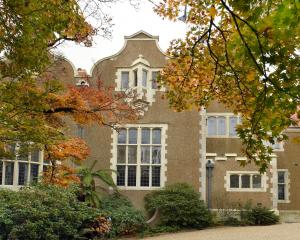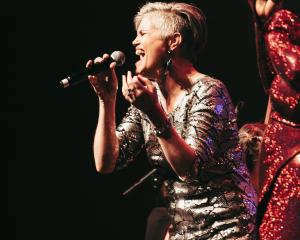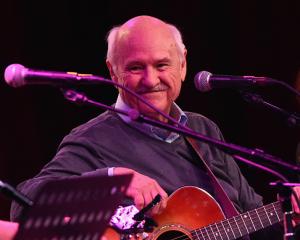
For the most part, Bill Martin has been turning his back on jazz audiences this year.
Not on the music though. After counting in his players, his thin frame moves with every beat, an arm whipping the music forward, cuing the next time signature or pulling someone to their feet to punch out an improvised solo.
Even with his back turned, it’s obvious Martin is loving it, guiding the groove.
Band leading is not the full story. Martin has been playing this year too, including filling out the programme at the Dunedin Jazz Club with the sort of small combo jazz he’s best known for. And, as usual, some of the music he’s been fronting has been both written and arranged by him.
But this year has been as much about playing the impresario as it has the piano; handing the spotlight to others.
Martin went part time on his day job for 2021 to clear space for the Dunedin Jazz Club project, of which he is director, pulling together a year-long programme of gigs that has brought some serious talent to town and the Dunedin jazz community out in numbers, Covid permitting.
A Rebirth of the Cool gig staged in April is now the stuff of legend.
Tonight, in the final show of the year, he’s allowing himself a little limelight and putting it all together, in what the musician-composer says is the culmination of a decade’s work.
The gig, Over to You: Bill Martin Septet, involves an "all-star" band — featuring Christchurch tenor saxophonist Gwyn Reynolds — playing Martin’s favourite pieces. It also foreshadows an album project.
Martin likes what he’s been hearing in rehearsals.
"It’s great," he said earlier this week.
"We’ve had some rehearsals already. I’ve been working with the rhythm players, Andy Lynch [bass] and Carl Woodward [drums]. We had some early rehearsals just working out the grooves."
Then local brass players Ralph Miller (trumpet) and Finn McKinlay (trombone) have been dropping by to go through the charts. They’ll be joined by Reynolds and the inimitable Nick Cornish (alto saxophone) on the night.
As culminations go, it’s looking like the cat’s meow.
Martin says he was first turned on to jazz while studying in Sydney as a young man, catching the likes of piano luminaries Mike Nock and Chris Abrahams. Involved in the rock music scene at the time, and a classically trained clarinettist, he decided the black and white keys were where it was at, and spent the next 10 years studying jazz piano.
"When I moved to Dunedin — 2008 I think it was — I think my focus was really on becoming a piano player ... learning the craft."
After a stint at the University of Otago, which involved writing a book on James Joyce, he stepped sideways into school teaching, where new challenges awaited.
"I guess my interest in arranging and writing music came about because I had become involved with school groups. I was forced to start arranging because I would not necessarily have a standard set of players.
"I’d have a violin player or a clarinet player who were quite good and so I had to write or arrange music that would work for those instruments."
Most recently, those skills have been put at the service of the club’s house band, the Dunedin Youth Jazz Orchestra, of which he was the instigator — an involvement that has further inspired his migration towards big band music.
It all seems to have been moving towards tonight’s gig.
"I’ve been searching for that ideal line-up to do some combo stuff. I guess the Dunedin Jazz Club has provided the opportunity for putting on performances with bigger groups," Martin says.
The Hanover Hall headquarters — at other times home to the Dunedin Symphony Orchestra — has provided the space and accoustics for things to scale up, for both audience and players, he says.
"It was a case of me drawing together a whole lot of stuff that I’ve been working on for a while and arranging it for that seven piece ensemble with the four horns."
In all, it is nine compositions, some familiar to club goers, others less so.
Martin says early influences for him included Chick Corea and his jazz fusion outfit Return to Forever, and there are elements of rock and funk in his own music.
"I’m trying to make music that does sound contemporary and modern. A lot of it has what you’d call straight rhythms."
It swings, but there’s also a straight rock feel.
New Zealand jazz group The Jac has also been influential — it played the Dunedin club earlier in the year.
It has been taking the format of the four horns and creating big textures, he says — tackling compositions that are developed and complex, music that’s slightly more arranged than a typical jazz ensemble.
It’s part of what Martin thinks might be an emerging trend towards slightly bigger ensembles.
Another visit this past year, by peripatetic tenor saxophonist Michael Gordon, also involved a larger group of Dunedin players assembling to support him.
"So, that’s kind of the direction I’m heading."
Martin’s big picture is that local musicians continue to learn from the players coming through the jazz club. With that in mind, he’ll be looking to fill next year’s programme with people open to collaboration. He has a few names in mind already.
Then, at some point, he hopes the direction of travel will flip. Rather than musicians from elsewhere heading to Dunedin to display their chops, Southern players will sally forth to show what they can do — both as musicians and composers.
Studio recordings of tonight’s pieces, sometime in the coming months, are part that plan.
"The goal for me is to record the compositions professionally, so we have a document of what we’re doing in Dunedin.
"I think once we do that it will be less of a case of trying to attract a local audience and more a case of trying to spread across the country what we are doing in Dunedin. The first thing we have to do with that is make some good recordings. Show what we can do."














